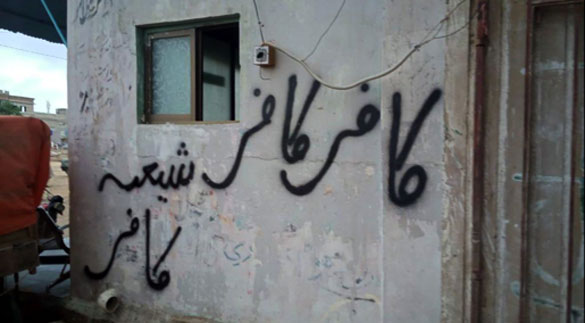Shia-Sunni hardliners again at each other's throats in Pakistan: Shia Tabarra versus Sunni Takfir

By
Arshad Alam, New Age Islam
17
September 2020
Pakistan
recently saw one of the largest demonstrations against the Shias. This
demonstration must be seen in the context of legislative changes made in
Pakistan with respect to its blasphemy laws.
According
to one provision, any one disrespecting the companions of the prophet will also
be deemed a blasphemer and will be dealt accordingly. This clause directly threatens
one of the important Ashura rituals of Shia called the Tabarra in which
they say not very kind things to some of the companions of the prophet. The
three caliphs, Abu Bakar, Umar and Usman are treated with utter contempt by the
Shia who regard them as usurpers of the legitimate rights of Ali to be the
first caliph.

Anti-Shia graffiti saying “Infidel Shias!” reported from Karachi
-----
Accordingly,
on the Day of Ashura, a number of Shia Ulama made disparaging remarks about the
three caliphs, partly out of tradition and partly to protest against the new
law. On the other side, we have certain Sunni organizations who have decreed
the Shia to be kafir, thus outside the pale of Islam and against whom an
attitude of enmity must be cultivated.
Groups like
Sipah e Sahaba, notorious for anti-Shia killings were joined in by Sunni
Barelwi groups and others raising anti-Shia slogans and demanding the arrest of
those Shia Ulama who had disrespected the companions of the prophet. If the
Imran Khan government wanted to show to the world that he has terror groups in
control, then all his efforts have come to a nought.
Allowing a
terrorist organization like Sipah e Sabaha to march with thousands in Karachi
is an admission of utter failure of the Pakistani state to reign in such
groups. Incidentally, fiery speeches against the Shia were made at the Muhammad
Ali Road, named after the founder of Pakistan, who himself was a Shia.
It is to be
expected that over the years these doctrinal divisions should have withered
away, but on the contrary, both Shia and Sunni positions have hardened. Some
Shias (https://www.youtube.com/watch?v=Brm1a1bpHFA) have argued that Tabbarra
forms an essential part of their faith, that without heaping curses on the
‘enemies of Ali and Fatima’, one cannot be a true Shia Muslim. It is not that
the Shia are innovating when they are indulging in this practice, on the
contrary, they believe, coming from Imam Jafar al Sadiq, that doing this is the
very expression of their faith.
While some
Shia Ulama have asked for restraint during such rituals, others have not been so
practical and have even criticised such moderation.
The Sunnis,
on the other hand, have responded to such alleged provocation with Madhe Sahaba
rallies which eulogise the rule of first three caliphs. In fact, in earlier
times, in the erstwhile United Provinces, it were the Shias who objected to
taking out such Sunni Madhe Sahaba rallies as it restricted their right of Tabbarra.
Times have
changed and in Pakistan, the Shias have been at the receiving end. The Sunnis
in Pakistan, who constitute the majority, now want their impression on the
statutes that govern the country. In their zealousness to show Shia hatred,
some Muslims actually praised Yazid, the killer of Hussain and his family
(https://www.youtube.com/watch?v=NiPkOJSsZXc). In their utter blind hatred of
Shias, some Muslims even tend to forget that they are glorifying the killers of
Prophet Muhammad’s family. For the Sunnis then, this hatred of Shias is also
becoming part of their belief system. From their childhood, they are being
taught that Shias are like ‘termites’ who are weakening Islam from within. It
appears that hating each other has now become a permanent part of Shia-Sunni
identity.
In the long
run this hatred can only devour whatever is left of Pakistan. Having gotten rid
of ‘Hindus’ after partition, Pakistan turned on its own citizens, the Bengalis,
massacring many thousands. After Bangladesh seceded, it then invented the
internal threat of Ahmadiyas, and outlawed and repressed them in the name of
protecting its version of true Islam. In this calculated pogrom of Ahmadiyas,
let us not forget that the Shia were enthusiastic participants.
It should
now dawn on them that being a minority, they should speak in terms of democracy
and minority rights, including the rights of the Ahmadiyas and the beleaguered
Hindus and Christians. Only then can they mount an effective challenge to the
current majoritarian Sunni lumpenism.
Something
has gone horribly wrong with the understanding of Islam. In the not so distant
past, the groups who are together vying for the blood of Shias were at logger
heads, each proclaiming the other as deviant. Those adhering to the ideologies
of al-Qaeda and Taliban did in fact blow up the holiest of Barelwi shrines
including the Data Darbar shrine. These groups, deriving legitimacy from
Deobandi Islam, were targeting music and myriad Sufi practices and actually
ended up killing many of them.
So while
Deobandis and Barelwis have come together to proclaim the Shias as kafirs, one
should not forget that they have deep doctrinal differences between themselves
and that they have called each other kafir not so long ago.
Pakistan
has seen too much bloodshed due to takfiri ideology. If the authorities do not
give urgent attention to the current anti-Shia climate being created, then the
country will descend into a blood orgy one more time. The only way to remedy
this situation is to publically proclaim the virtues of pluralism; that each
interpretation of Islam is as valid as the other. Only then can such mindless
and bigoted takfiri polemics come to an end.
----
Arshad
Alam is a columnist with NewAgeIslam.com
URL: https://newageislam.com/islam-sectarianism/shia-sunni-hardliners-again-each/d/122879
New Age Islam, Islam
Online, Islamic Website, African Muslim News, Arab World News, South Asia News, Indian Muslim News, World Muslim News, Women in Islam, Islamic Feminism, Arab Women, Women In Arab, Islamophobia in America, Muslim Women in West, Islam Women and Feminism
